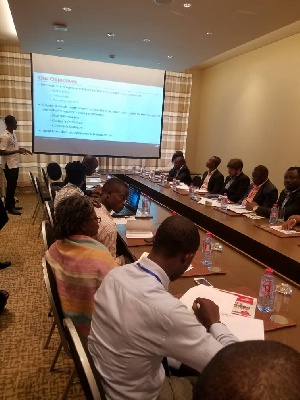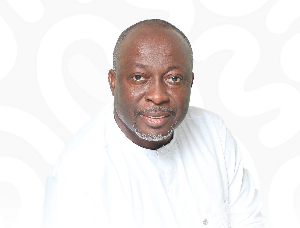Ghana’s inability to industrialise has been attributed to the high cost of electricity and this requires cheap sources of electricity such as nuclear power to address the situation.
The evidence is that, demand for electricity during peak hours are used for domestic purposes.
The high cost of electricity is said to have made Ghana less attractive to investors who opt for neighbouring countries with cheaper tariffs.
The Economy of every country depends on local production and export goods and services, thus industrialization.
Deputy Director of Nuclear and Alternative Energy at the Ministry of Energy Dr. Robert Bright Mawuko Sogbadji is optimistic that focus on cheap sources of electricity especially nuclear energy is what would spearhead industrialization.
To buttress is point, he said countries in Europe utilizing nuclear energy pay far less for electricity compared to those without nuclear power.
Speaking in Accra at a Boot Camp organized by Rosatom Central and Southern Africa, he noted that Ghana has a low Per Capita Electricity Consumption in kilowatt hour (KWh) which stands at 355 KWh due to the high cost of electricity reflecting the lack of industrialization.
Low Per Capita Electricity Consumption in kilowatt hour
However, the Per Capita Electricity Consumption in kilowatt hour in some industrialised countries are Malaysia - 4,596 KWh, South Africa - 4,228 KWh, Singapore - 8,845 KWh, Germany - 7,035 KWh, USA - 12,986 KWh and UAE - 11,264 KWh.
Ghana’s tariff expensive
Residential tariff of electricity in Ghana is higher than that of Egypt, Zambia, South Africa, Nigeria, Botswana, Zimbabwe, Kenya Tanzania among others.
Dr. Sogbadji announced that Ghana plans to develop nuclear energy infrastructure for providing secure, clean, affordable and reliable base-load power to stimulate industrial and economic growth in Ghana and for export.
First nuclear power plant ready 2029
According to him, the construction of the first nuclear power plant in the country is expected to take off in 2023 while the commissioning and operation is slated for 2029.
Deepen the diversification of generation mix
“The aim is to opt for the Nuclear option is that it helps to deepen the diversification of the present generation mix, reduce the national greenhouse emissions, reduce detrimental environmental impact as well as reliable and cost-effective enough to serve as the base load.
Clean energy sources of the future
“The Energy policies also geared towards Ghana’s commitment to the Paris Agreement on Climate change and the National Determine Contributions Renewable and Nuclear Energy (the clean energy sources of the future) is expected to enhance Ghana’s energy security and to serve as mitigation against climate change” he added.
Dr. Sogbadji noted that nuclear power’s economic and environmental advantages, as well as the availability of nuclear waste management technologies, make it needed base-load addition to the country’s existing power generation mix.
He explained that the timely implementation of this policy would go a long way to fulfil the country’s quest to provide secure, reliable and clean energy for sustainable national development and to also achieve the vision of being a net exporter of electricity to sub-region.
He said all governments have identified key areas for industrialize growth and notably among them are; bauxite – alumina – aluminum industry, the iron ore industry, the trans-regional railway network and processing of all raw materials into finished products, among others.
Dr. Sogbadji stated that all industrially developed countries rely on cheap power supply to make these industries profitable and globally competitive.
Dmitry Shornikov, General Director Rosatom of Central and Southern Africa said nuclear power accounts for 11% of the world's electricity supply.
According to him, about 450 nuclear power reactors globally, about 60 more reactors are under construction Nuclear power plants are operational in 30 countries worldwide with 17,000 reactor years of experience.
He noted that additional 150-160 reactors are planned while 50 countries have 225 research reactors
Ryan Collyer, Communications Director for Rosatom Central and Southern Africa said Rosatom has so far built 122 research reactors
He stated that nuclear reactors do not emit greenhouse gases during operation adding that over their full lifetimes, they result in comparable emissions to renewable forms of energy such as wind and solar.
According to him, nuclear energy is not against renewable energy in any way, but it is extremely important to realise that every country needs an energy mix, and in this mix, it is vital to have a source of power that can create base-load as and when it is needed.
Collyer added that nuclear power is one of the safest methods of producing energy when compared to that of fossil fuels
He said coal power generation alone has resulted in over 4,000 times more deaths than nuclear
“The initial cost of nuclear power plants is very expensive. However, it is unlike most other technologies, in that it equates to a 60 to 80-year investment, as nuclear power plants far outlive their fossil fuel rivals by as much as three times.
“Once the initial costs have been paid off, a nuclear power plant creates abundant power for a fraction of the cost and essentially becomes a cash cow for the country,” he added
600% increase in tariffs in 10 years
The retail price of electricity in Ghana has seen nearly 600 percent increase over the past decade.
The Energy Commission indicates that the average end user tariff for electricity consumed per every kilowatt hour has increased consistently from 7.8 pesewas in 2006 to 54 pesewas as at the end of 2015, representing a 594 percent jump over the period.
In dollar terms, however, that is a 75 percent increase over the last 10 years, which indicates the effects of currency depreciation and inflation on the pockets of Ghanaian consumer
Business News of Thursday, 5 July 2018
Source: thefinderonline.com
Nuclear energy is the key to Ghana’s industrialization
Entertainment












